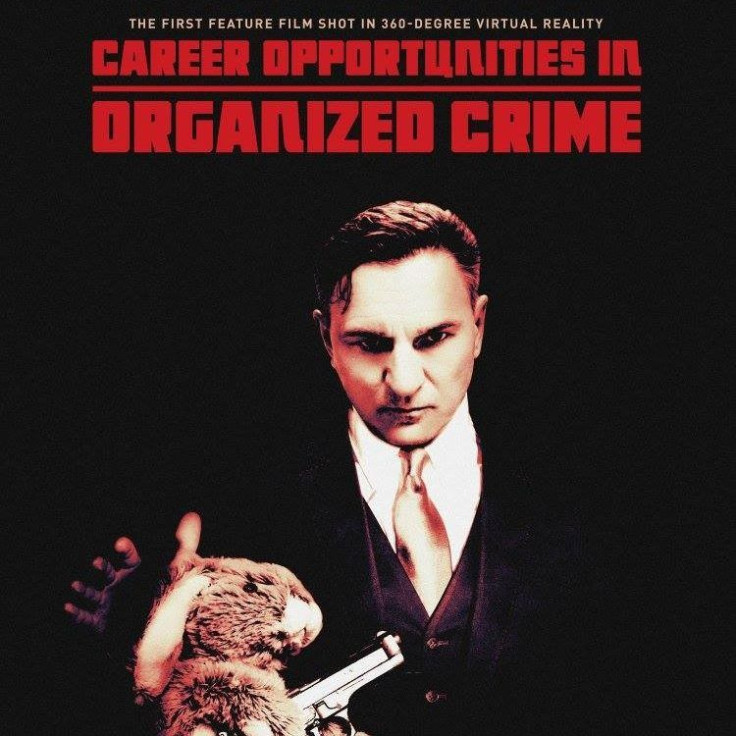Career Opportunities In Organized Crime, a 360-degree mockumentary film by Alex Oshmyansky, and perhaps the first feature length VR film ever made, follows a camera crew as they film a recruitment video for the Russian Mafia in Baltimore. Two actual films were recorded separately at the same time: the first, the recruitment video, and the second, a 360-degree film that lets viewers look and laugh at what’s going on behind the camera.
If you were wondering who Oshmyansky is, he’s the guy behind the camera in the videos above. Oshmyansky, who has earned a PhD in mathematics from Oxford, a medical degree from Duke and has completed residency training at both Johns Hopkins and Harvard Medical School, financed the film himself. He is also currently a radiologist in Baltimore and just recently accepted a position as a consulting assistant professor at Stanford, as well being the head of Akibimi Productions, the company behind Career Opportunities.
According to an interview Oshmyansky had with Seth Ferranti, six GoPros were used to shoot the 360-degree video component of the film, using rigs such as Freedom 360 and 360Heroes . The footage was then stitched together using a variety of software like Adobe After Effects, Video Stitch and Autopano Pro. This echoes the general sentiment felt about 360-degree films: it’s not very expensive at an entry level (two GoPro cameras back-to-back are all it takes), but it is more costly to finish post-production work.
Clan Khordorkovskoi’s — the fake Russian Mafia clan the film is based around — website lists job opportunities for web developers and programmers with experience in C++, Java and Ruby on Rails, as well as firearm experts, sanitation industry professionals and “security personel (sic),” because the clan has come up with a novel new way of making money. Let’s just say it involves identity fraud, computers, a little bit of capitulation and a lot of vodka.
Malcolm Mills happens to play one of the programmers recruited to help Clan Khordorkovskoi move on past their hard times, and one of the mob’s first American recruits, while Michael Barra plays Lonya, a Russian mobster with a big heart who will cut your spleen out if his boss gave him the word. Mills and Barra have experience acting for the screen and stage, and describe VR films as existing in a special place between those two forms of entertainment, at least from an actor’s perspective.
“A play can luxuriate in rehearsals, but films rarely have a third as much time; expenses go elsewhere. The VR cameras overheat easily, so you have to be patient, but it's a similar patience to waiting while lighting a film or tech-ing a play; the greater issue is how to spend your downtime to align when you'll be ready with when the tech stuff is ready,” Mills told iDigitalTimes. “Finally, there's a [vanity] issue: in a close-up you can hide a chubby tummy offscreen, without stressing your diaphragm and holding your breath, which directly correlates how naturally you'll act. But like stage, it's all seen in VR.”
Unlike a regular film, the director and crew can’t be in the same room as the actors when filming in VR, not to mention all the extra costs and time needed for set decorations for 360-degree scene. This problem particularly poses an issue when iterating through the same scene with different takes, although Oshmyansky found a way around that by casting himself into his film (and as the cameraman no less).
“It's on camera so your level of play is intimate like film, but because you can't cut in the middle of a scene (or so we thought) you play every scene fully through. The camera sees everything so you are never off,” said Barra. “Working with the director isn't drastically different. They give you direction before and notes after. They can't side coach during a scene, but that's it.”
Both actors believe that VR has a future in filmmaking, even though technology has not yet caught up to the ambitions of filmmakers.
While regular filmmakers have figured out how to capture an audience’s attention with what Mills calls “well-composed images in 16:9,” the theater-like, expressive acting needed to do the same in 360-degree films means the medium has a future separate from the silver screen. What Barra calls an “immersive experience [an audience doesn’t] get with traditional films” will define VR filmmaking and 360-degree films.
Career Opportunities is planned to be released sometime this spring on iOS and Android, as well as for the Oculus Rift and Samsung Gear VR. Make sure to follow the film’s Facebook page for updates.

















